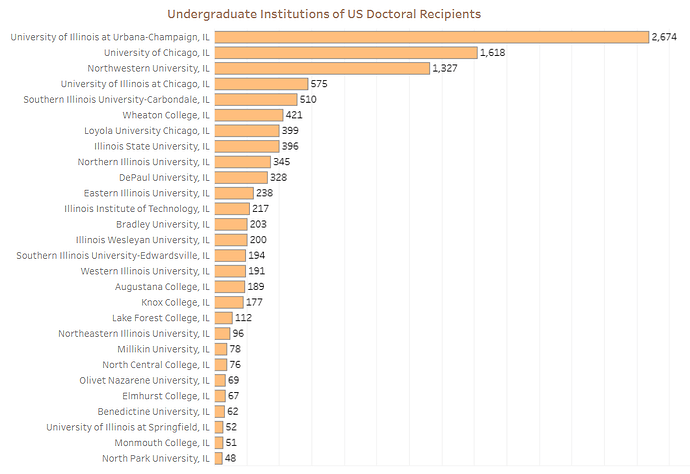No, I am not saying that.
I wouldn’t necessarily say it’s a high quality proxy, but it is an indication in its favor/likelihood. Going back to one of the original links in my first post (this one), here is info on schools in Illinois that produced doctoral recipients between 2010-2018.
The first three schools on the list (UIUC, U. of Chicago, and Northwestern) probably aren’t a big surprise to anyone. But then we see that Southern Illinois - Carbondale is the fifth school out of 28 on the page with 510 doctoral recipients. We find out that its undergrad population is 8,147. Using the same proportion idea I used earlier, I get a .062 proportion. If I compare it to Southern Illinois - Edwardsville (undergrad pop. 9,967) with its 194 doctoral recipients, I get a 0.19 proportion. Knowing virtually nothing about either of these schools except that I’m pretty sure neither charges out-of-state students a different tuition rate than in-state students, I would guess that there’s probably a bigger pool of intellectually curious people at the Carbondale campus based on this one data point. Could I be wrong? Absolutely. But I’d think the odds are in my favor.
If I look at the list and see Loyola Chicago (11,819 undergrads, 399 doctoral recipients, .033 proportion) and DePaul (14,294 undergrads, 328 doctoral recipients, .022 proportion), two schools that I have a better sense of that are all roughly in the same size category, then that gives me a sense that perhaps there might be at least a similar proportion of intellectually curious students at Carbondale as at those two, and perhaps even more. Again, maybe I’m right and maybe I’m wrong, but it’s a way of making educated guesses when you’re unable to make visits or don’t know as much about a college as it hasn’t been mentioned 20k times on the forum.
As Illinois’ Wheaton is 6th on the list with 421 doctoral recipients and 2,341 undergrads (.179 proportion), I think there’s a pretty good chance that this is the Wheaton that made Dataverse’s list of schools producing PhDs while accounting for the school’s size.
Looking at this same Illinois list, it would appear that Illinois Wesleyan and Augustana might have a more intellectually curious environment than Olivet Nazarene and Elmhurst, even though they’re all relatively small schools. For a student who’s looking for a small, less expensive option in the midwest, this could be an easy filter to determine where one should start researching. It’s not a guarantee, but it’s probably generally good guidance.
So if we see schools of the same type (baccalaureate, master’s, doctoral, etc) that have a similar or higher proportion of doctoral recipients, then we might be able to make a comparison with schools that we are familiar with. Thus, it’s a way to find some “hidden gems.” According to the College Board, there are 2,152 4-year colleges in the U.S… I’m not naive enough to believe that they all provide a high-quality education to their students. But I do think that there’s more than the 100 or so of the “known” schools that are high quality, and that this is a data point that could help to identify more of those schools. Thus, the inclusion of some of the “surprising” schools I’ve mentioned in previous posts would be indications of other schools that are likely to be hidden gems, too (at least hidden to most CCers).
